#Jawed Rehman
Link
Sanyogita Bhave, Devishi Madaan, N.K. Pant, Mahati Ramesh, Jawed Rehman, Rituparna Sengupta, Eklavya Sood, Deepak Tijori
#Sanyogita Bhave#Devishi Madaan#N.K. Pant#Mahati Ramesh#Jawed Rehman#Rituparna Sengupta#Eklavya Sood#Deepak Tijori
0 notes
Text
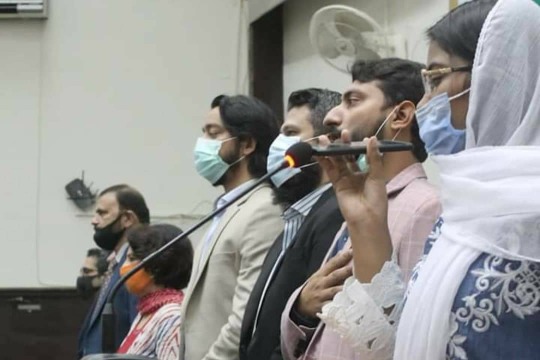
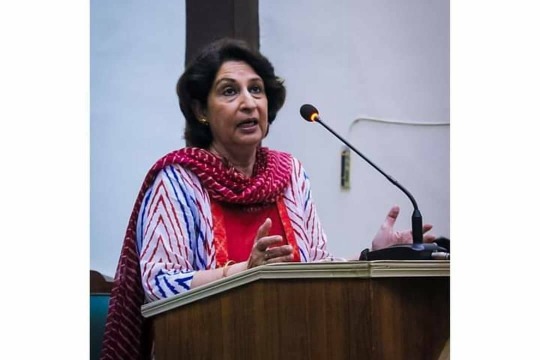
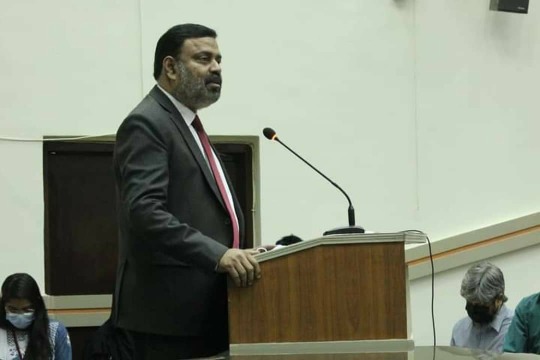




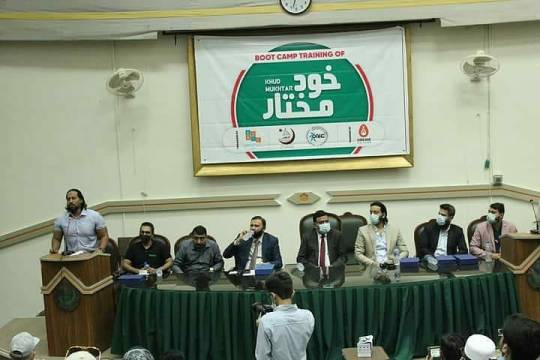
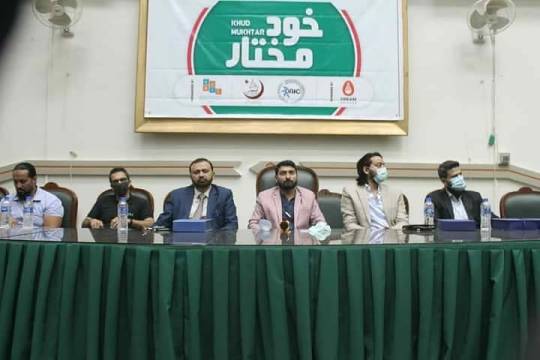
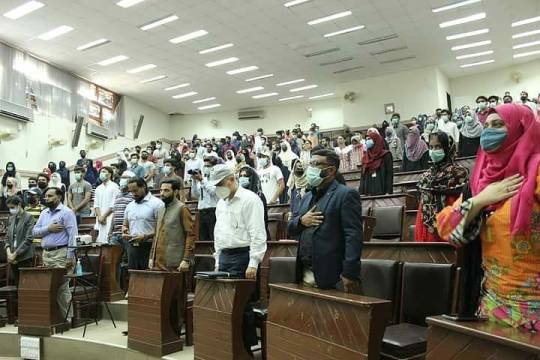
Karachi University Business Incubation Center (KUBIC) / ORIC organized the launching ceremony of ‘Khud Mukhtar Training Program (KMTP) which is a training series to empower the youth. The trainings will be conducted by the trainers who have successfully launched and managed their business in Pakistan.
Honorable Prof. Dr Khalid Mehmood Iraqi - Vice-Chancellor, Dr Aliya Rehman - Director KUBIC/ORIC, Mr. Talha bin Shuja – Manager KUBIC/ORIC, Dr. Asim Ali - Associate Professor & Student Advisor from University of Karachi graced the Launching Ceremony of ‘Khud Mukhtar Training Program (KMTP).
Seasoned entrepreneurs, businessman and corporate leaders participated as ‘Guest of Honor’ and shared their valuable insights.
Rafiq Malik, COO, BYKEA
Abdul Jabbar Rathod - Executive Director Dreamworld,
Muhammad Hassan Khan, CEO, Trax Logistics
Jawed Siddiqui Mitiwala, Chairman Health & Education Committee, KCCI
Mr Saleem Akhtar, COO, Progressive Traders Pvt. Ltd
Waqas Azeem- CEO, Sizzlers / Chop-Soy / Kebabi / Pizza 363
Shayan Shamim, AGM Commercial - SWVL
It was a houseful event and the audience learned the basics of starting a startup/business and got the motivation from the stories of seasoned entrepreneurs which was followed up by a Q/A panel discussion session.
#hafizasabeelajawaid #KUBIC #ORIC #SAO #UOK #VC #manager #director #CEO #COO #Chairman #DreamHatcher #khudmukhtar #LaunchingCeremony #training #bootcamp #startups #business #learning #networking #oppertunities #Bykea #dreamworldresort #Trax #SWVL #sizzlers #chopsoy #KEBABI #Pizza363 #businessideas #businesstips #coaching #entrepreneur #entrepreneurship #leadership #SOPs #followed #officeevent #organizer
1 note
·
View note
Text
PCB announces match officials' panels

Following a comprehensive review and annual appraisal process, the Pakistan Cricket Board Thursday announced its panel of match officials for the 2020-21 domestic season, which will commence with the National T20 Cup from 30 September.
The first round matches of the double-league competition will be held in Multan, while the second round will be played in Rawalpindi.
The six-member PCB Elite Panel of Match Referees include Ali Naqvi (Lahore), Iftikhar Ahmed (Karachi), Muhammad Anees (Lahore), Muhammad Iqbal Sheikh (Hyderabad), Nadeem Arshad (Faisalabad) and Prof. Mohammad Javed Malik (Multan), while 14 members of the PCB Elite Panel of Umpires are Ahsan Raza (Lahore), Aftab Hussain Gillani (Bahawalpur), Asif Yaqoob (Islamabad), Faisal Khan Afridi (Sargodha), Ghaffar Kazmi (Lahore), Imran Javed (Karachi), Nasir Hussain Snr (Lahore), Qaiser Waheed (Lahore), Rashid Riaz Waqar (Lahore), Saqib Khan (Abbottabad), Shozab Raza (Lahore), Syed Imtiaz Iqbal (Karachi), Waleed Yaqub (Lahore) and Zameer Haider (Lahore).
These 20 elite officials will be on 12-month retainer contracts and will be responsible for sharing officiating duties in the First XI Cricket Association and HBL Pakistan Super League matches.
In the 2019-20 season, the PCB had offered contracts to 18 elite match officials. Mohammad Iqbal Sheikh and Nadeem Arshad, are the two additions in the match referees panel, while Aftab Hussain Gilani (promoted from the development panel), Imran Javed, Nasir Hussain Snr, Qaiser Waheed, Syed Imtiaz Iqbal, Waleed Yaqoob (promoted from the development panel) and Zameer Haider are the umpires who will be offered contracts for the first time.
The PCB has introduced supplementary panel for the first time, which includes the match referees and umpires who were unable to find places in the elite panel. They will be offered season contracts, which includes match fees and daily allowances. This panel will be responsible for officiating in the Second XI Cricket Association matches and will set-up for First XI and HBL Pakistan Super League duties as and when required.
The 72-member PCB Development Panel of Umpires has been equally divided into two groups, with the first group to officiate in the PCB-organised age-group matches and the second group to stand in club, grassroots and school fixtures. The playing control team in these matches will be led by the PCB Development Panel of Match Referees, which comprises 15 officials.
The PCB Development Panel of Match Referees includes a female official, Saman Zulfiqar from Sheikhupura. This is the third successive year she has been named in the panel as the PCB continues to encourage its women officials to get involved with the game if they have any aspirations of representing the country at the international level.
Similar process was followed and adopted while finalising women umpires for the 2020-21 domestic season, who will be offered season contracts. These women officials will be involved in officiating women's domestic matches, schedule of which will be shared in due course.
The notable inclusion in the eight-member PCB Panel of Women Umpires is the addition of Sabahat Rasheed, who played 13 One-Day Internationals for Pakistan from 2005 to 2007. The 37-year-old from Lahore was a right-arm off break and is a graduate of Arts and Education.
Bilal Qureshi, Manager, Umpires and Referees: "I want to congratulate all the match officials on their inclusion in the 2020-21 domestic panel and hope they will have a good season in which they will perform their duties to the best of their abilities.
"This year's assessment and appraisal process was transparent and merit-based in which two independent former ICC match officials reviewed the performances of all the officials, while accessing their self-assessments and video decisions during the season (where available) as well as presentations, interviews, knowledge and understanding about the Laws, decision-making and man-management skills. Separately, the match officials also underwent fitness tests, which are mandatory and as per international standards.
"This robust process was carried out to ensure the best match officials can officiate in the PCB-organised tournaments and through their good knowledge and understanding of the Laws and regulations, contribute in enhancing the standard and quality of the 2020-21 domestic cricket.
"At the same time, we have provided a pathway to the supplementary and development panel umpires with the incentive being a place in the elite panel. I understand this is a challenging pathway but such is the role that only the best of the best can move up the ladder and this can only happen through determination, consistent performances, correct application of the Laws and regulations, and good match management."
PCB Elite Panel of Match Referees - Ali Naqvi (Lahore), Iftikhar Ahmed (Karachi), Muhammad Anees (Lahore), Muhammad Iqbal Sheikh (Hyderabad), Nadeem Arshad (Faisalabad) and Prof. Mohammad Javed Malik (Multan)
PCB Elite Panel of Umpires - Ahsan Raza (Lahore), Aftab Hussain Gillani (Bahawalpur), Asif Yaqoob (Islamabad), Faisal Khan Afridi (Sargodha), Ghaffar Kazmi (Lahore), Imran Javed (Karachi), Nasir Hussain Snr. (Lahore), Qaiser Waheed (Lahore), Rashid Riaz Waqar (Lahore), Saqib Khan (Abbottabad), Shozab Raza (Lahore), Syed Imtiaz Iqbal (Karachi), Waleed Yaqub (Lahore) and Zameer Haider (Lahore)
PCB Supplementary Panel of Match Referees - Ahmer Saeed (Karachi), Aleem Khan Moosa (Karachi), Ali Gohar (Karachi), Aziz-ur-Rehman (Lahore), Kamran Chaudhry (Lahore), Khalid Jamshed (Lahore), Muhammad Aslam (Quetta) and Tanveer Afzal (Faisalabad)
PCB Supplementary Panel of Umpires - Abdul Moqeet (Lahore), Ahmed Shahab (Lahore), Aley Haider (Karachi), Aslam Bareach (Quetta), Farooq Ali Khan (Abbottabad), Ghulam Sarwar (Sibi), Kashif Sohail (Khanewal), Khalid Mehmood Sr. (Karachi), Majid Hussain (AJK), Mir Dad (Islamabad), Muhammad Asif (Lahore), Muhammad Imran (Sargodha), Muhammad Sajid (Charsadda), Tariq Rasheed (Lahore) and Zulfiqar Jan (Charsadda)
PCB Development Panel of Match Referees - Abu-al-Hasnat Rao (Lahore), Allah Ditto (Islamabad), Athar Laiq (Karachi), Bilal Moinul Haq Khiljee (Lahore), Fazal Akbar Shah (Peshawar), Ghulam Mustafa (Kasur), Inamullah Khan (Lahore), Masood Anwar (Khanewal), Muhammad Amiruddin Ansari (Karachi), Muhammad Jawed (Karachi), Mujahid Jamshed (Lahore), Saman Zulfiqar (Sheikhupura), Samiul Haq (Faisalabad), Sohail Idrees (Lahore) and Sohail Khan (Lahore)
PCB Development Panel of Umpires (I) - Aamer Atta (DG Khan), Abdul Wasay (Kohat), Ahmed Nadeem (Peshawar), Akmal Hayat (Faisalabad), Asif Farooq Awan (Gujranwala), Farooq Anwar Bajwa Faisalabad), Farooq Jan (Charsadda), Ghayyur Hussain (Peshawar), Hassan Mahmood (Lahore), Imran Ullah Aslam (Bahawalpur), Irfan Haider (Islamabad), Javed Ashraf (Lahore), Kamran Khalil (Lahore), Khalid Mahmood Jr (Quetta), Mesam Turabi (Gujjar Khan), Muhammad Fayyaz (Peshawar), Muhammad Irfan Dilshad (Lahore), Muhammad Kaleeem (Lahore), Muhammad Waqas (Lahore), Nadeem Ghouri (Lahore), Nadeem Iqbal (Multan), Nasar Khan (Mardan), Qaiser Khan (Lahore), Rafiq Ahmad (Dadu), Rana Muhammad Arshad (Faisalabad), Raweed Khan (Charsadda), Raza Asghar (Sheikhupura), Saifullah Khan (Sargodha), Saleem Butt (Rawalpindi), Shamim Ansari (Karachi), Sohail Khan (Charssada), Sohail Zaman Khattak (Peshawar), Sultan Mahmood (Loralai), Syed Fahim Ahmed Bukhari (Karachi), Waqar Ahmed (Islamabad) and Waseemuddin (Kohat)
PCB Development Panel of Umpires (II) - Asim Alvi (Karachi), Abdul Karim (Naseerabad), Abdul Qayoom (Karachi), Abrar Ahmed (Kasur), Adnan Rashid (Lahore), Akhtar Ali (Karachi), Ameen Abbasi (Bahawalpur), Anser Mahmood (Pattoki), Aqeel Aadil Khan (Karachi), Azizur Rehman (Karachi), Dilshad Ali (Multan), Hameed Khan (Quetta), Haroon Malik (Sargodha), Hashim Ali (Lodhran), Hidayatullah (Pishin), Jaffar Hussian (Peshawar), Jamshid Iqbal (Peshawar), Khalil Ahmad Siddiqi (Kasur), Maqbool Ahmed (Faisalabad), Muhammad Aamir Sharif (Kohat), Muhammad Arif (DI Khan), Muhammad Basit Siddiqi (Lahore), Muhammad Nazir Butt (Karachi), Muhammad Yousaf (DG Khan), Mumtaz Ali (Loralai), Munir Ahmed (Kasur), Naik Muhammad (Kohat), Naseer Ahmed (Chakwal), Naushad Khan (Peshawar), Naveed Khan (Nowshehra), Noor ul Hakam (Buner), Sagheer Ahmed (Lahore), Saifullah (Lahore), Shahid Qayyum (Faisalabad), Waqas Zeb (Lahore) and Zeeshan Arif (Mirpur, AJK)
PCB Panel of Women Umpires – Afia Amin (Lahore), Hummairah Farah (Lahore), Nazia Nazir (Lahore), Nuzhat Sultana (Karachi), Riffat Mustafa (Kasur), Sabahat Rasheed (Lahore), Saleema Imtiaz (Karachi) and Shakila Rafiq (Kasur).
Read the full article
0 notes
Text
Lok Sabha 2019: 25 Muslim Parliamentarians, but none from the BJP

NDA ally, the Ram Vilas Paswan -led LJP, sends the lone minority community MP
Despite the minority community polling around 14 per cent of the total vote share, their representation in the lower house is less than five per cent, going by the results of 2019 general election.
This time, around 25 Muslim Parliamentarians have been elected to the Lok Sabha – a marginal increase from the 23 MPs elected in the last Lok Sabha election.
All the six Muslim candidates fielded by the BJP failed to get elected to the lower house even as the saffron party led on a staggering 303 seats.
In stark contrast, the Samajwadi Party and the Bahujan Samaj Party have each given three Muslim MPs in the House. These include Kunwar Danish Ali (Amroha), Afzal Ansari (Ghazipur) and Haji Fazlur Rehman (Saharanpur) of the BSP and S. T. Hassan (Moradabad), Shafique Rehman Barq (Sambhal), and Azam Khan (Rampur) from the SP.
Along with Uttar Pradesh, West Bengal, too, has given six Muslim MPs - five of them from the TMC and one from Congress.
Meanwhile, The All India Majlis-e-Ittehad-ul-Muslimeen (AIMIM) chief Asaduddin Owaisi won the Hyderabad seat and his party’s candidate, Imtiaz Jaleel Syed, contesting from Aurangabad in Maharashtra is leading by a thin margin over sitting MP Chandrakant Khaire of the Shiv Sena.
The Left Front only managed to win the Alappuzha seat in Kerala and the lone winner was the CPI (M)’s A. M. Ariff.
In Kerala, the Indian Muslim League’s E T Mohammed Basheer (from the Ponnani constituency) and P K Kunhalikutty (from Malappuram) have been elected.
In the valley, all three seats went to the National Conference. The winners were Farooq Abdullah, Mohammad Akbar Lone, and Hanani Masoodi.
The Congress has four Muslim candidates who are leading: Abdul Khaleque (from Barpeta in Assam), Mohammad Jawed (from Kishanganj in Bihar), Abu Hasem Khan Chowdhury (from Maldah Dakshin in West Bengal), and Mohammad Sadique (Faridkot in the Punjab).
Read the full article
0 notes
Text
This slideshow requires JavaScript.
***
The hollowing out of Indian news media—from being serious, agenda-setting, conscience-keepers, to frothy, gutless, market-driven beasts without a soul—is all too obvious, but it was never more apparent than during the recent India-Pakistan kerfuffle.
As the two nuclear powers peered into the abyss, there was a barely a commentary in any part of the world which did not find a problem with the bellicose, hate-spewing, war-mongering discourse on television, mostly Indian news channels but some Pakistani too.
But what about print journalism?
What role did good, “quality” newspapers on either side of the line of control play in lending their wisdom, in lessening the tension, in counselling peace, in urging for dialogue, in not giving their readers more of the poison of last night’s TV?
How did they use their most sacred space, the sanctum sanctorum of a newspaper, the editorial and op-ed pages?
***
Pothan Joseph in the evening of his life, in Bangalore. (courtesy: T.J.S. George)
A good case study is the Dawn of Lahore and Deccan Herald of Bangalore.
Dawn is Pakistan’s most-respected English newspaper. Set up in Delhi in 1941 as a weekly by Mohammed Ali Jinnah, it became a daily the following year, with a South Indian Christian Pothan Joseph as its first Editor. (Dawn moved to Lahore after its Delhi office was set on fire by the Jan Sangh in September 1947.)
Deccan Herald is Karnataka’s oldest English newspaper. It was established in 1948 by K.N. Guruswamy, an excise contractor who was persuaded by the then Diwan of Mysore to abandon plans of starting a theatre on M.G. Road in favour of a modern newspaper. By a cute coincidence, Pothan Joseph was its first Editor, too.
Pothan Joseph is long gone. His two babies have grown, matured, and are in their 70s.
Over time, both papers have had their troubles, but both have retained their ethos. Both are nearly similar in girth and gravitas; both are known for not taking the low road; both have an editorial page and an opposite-editorial page; and both are, generally speaking, sober purveyors of news and views with an evolved weltanschaaung.
So, what did Dawn and Deccan Herald bring to the table during the recent skirmish?
***
A purely quantitative analysis of the edit and op-ed pages of the two newspapers from February 15, the day after the CRPF convoy was attacked in Pulwama, to March 10, after the war cries had somewhat died down, reveals how Indian print media has abdicated its role as thought-leader.
The broad numbers:
# Over the 24-day period, both Dawn and Deccan Herald had some “content” or the other on its edit and op-ed pages relating to the India-Pakistan situation.
But…
# Dawn carried 15 unsigned editorials, 25 opinion/comment pieces, 2 news analyses, 34 letters to the editor, and one editorial cartoon.
# In contrast, Deccan Herald carried a mere 7 editorials, 7 opinion pieces, 3 news analyses, 2 interviews and 30 letters.
In other words, Dawn beat Deccan Herald hands down, the scoreline reading 77-49.
If letters to the editor are taken out of the equation, it is a more dismal 43-19.
Dawn consistently, repeatedly and creditably used its stature as a voice of reason and batted for sanity. More importantly, instead of mortgaging its edit and op-ed space to academics, security experts, think-tankers, diplomats, military men and other vested interests, it often deployed its own editorial team, reflecting the paper’s stand.
A former editor of Dawn, its resident editors and staff writers, all chipped in. Its Delhi correspondent Jawed Naqvi did two front-page analyses, and three opinion pieces. An Indian journalist Latha Jishnu was among two women who lent voice to the debates.
Dawn also used its front page to send a signal to the powers-that-be in Pakistan effectively, by publishing an appeal by three former foreign secretaries.
***
Probably because of Bangalore’s distance from Delhi; probably it had other things to do deal with; probably because it is improperly staffed; probably because it operates in India’s most crowded newspaper market, Deccan Herald fell back on the usual rent-a-quote policy wonks and retired bureaucrats.
Most of its letters to the editor were from the usual names that populate its edit page on most other days, many of them dressing up propaganda messages received on WhatsApp.
Deccan Herald once had a correspondent in Pakistan. In its absence now due to visa restrictions, there was nothing like a view from the Pakistani side. The only “independent” view came from a New York Times syndicated piece.
And because Deccan Herald works on pre-cast design templates, it was constrained from using its front page to denote anything of significance. Business as usual.
In fact, on 12 of the 24 days, the front page was an advertisement in Deccan Herald.
***
By carrying 100% more editorials than Deccan Herald, and 200% more opinion pieces, Dawn underlines the value it places on the edit and oped pages in articulating the newspaper’s voice, in shaping minds and moulding policy—attributes Indian newspapers have abandoned in the post-liberalisation age in the name of “giving the readers what they want”.
Dawn also demonstrates, generally speaking, that their in-house writers, past and present, have the intellectual bandwidth to churn out cogent prose of a 1,000 words or more. There is no evidence of that in Deccan Herald in the 24-day period.
With general elections round the corner, Deccan Herald also comes up woefully short in explaining the motivation and implications. And like most Indian newspapers flooded with advertisements of Narendra Modi, is happy to be seen beating a triumphalist drum that is music to the ruling BJP.
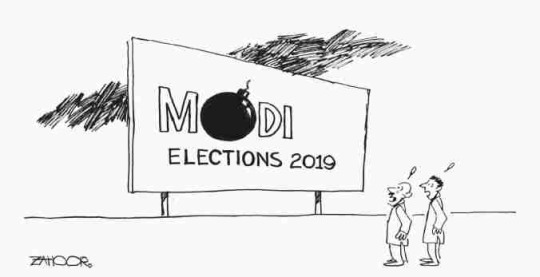
Editorial cartoon on the edit page of ‘Dawn’, by Zahoor
***
The edit and op-ed pieces in Dawn:
February 15 to March 8
February 15: Pulwama attack, editorial
February 19: Shun the TV, stop a war: opinion by Jawed Naqvi
February 20: PM’s bold offer for dialogue with India: editorial
Geopolitical challenges, Zahid Hussain, opinion
Blaming Pak for Pulwama: two letters to the editor
February 22: One speech and more: Asha’ar Rehman, opinion
February 23: Ban on Jamaatud Dawa, editorial
Shoddy Pulwama investigation, three letters to the editor
February 24: Time for restraint, by Iamul Haq, Riaz H. Khokhar and Riaz Mohammad Khan, page one comment by ex-foreign secretaries
Militant-free Pakistan, Muhammad Amir Rana, comment
A terrifying fallout, Latha Jishnu, comment
Pulwama attack, two letters to the editor
February 25: The divide over Kashmir, editorial
February 26: War rhetoric and reality, editorial
The real threat to India, Jawed Naqvi, comment
India’s response post-Pulwama, two letters to the editor
February 27: When truth is the first casualty, Jawed Naqvi, news analysis
On the brink, editorial
Dangerous escalation, Zahid Hussain, comment
Balakot attack, two letters to the editor
Pulwama affair, two letters to the editor
Aiming for peace, editorial
De-escalate now, Khurram Husain, opinion
Pulwama attack, one letter to the editor
PAF’s victory for Pakistan, two letters to the editor
March 1: Time for diplomacy, editorial
This side of war, Asha’ar Rehman, opinion
Bravo PAF, bravo the nation, three letters to the editor
March 2: Towards normality, editorial
Balakot and beyond, Abbas Nasir, opinion
Wag the dog, Irfan Husain, opinion
Releasing Indian air force pilot, two letters to the editor
Downside of war, two letters to the editor
March 3: LoC attacks, editorial
Now the diplomatic battle, Munir Akram, opinion
Irony of history in Pakistan-India conflict, letter to the editor
The ‘real terrorist’, two letters to the editor
March 4: Effective diplomacy needed, editorial
Surgical Reich, Asad Rahim Khan, opinion
Indian jingoism, one letters
The issue is Kashmir, one letter
March 5: Fighting militancy, editorial
How to talk peace, Arifa Noor, opinion
Death wish as nationalism, Jawed Naqvi, opinion
Not isolated, Moeed Yusuf, opinion
Pakistan’s stand, two letters to the editor
March 6: Bigoted minister, editorial
Pulling back from the brink, Zahid Hussain, opinion
Information warfare: danger to Pakistan, one letter to the editor
Jingoistic Indian media, one letter
March 7: De-escalation time, editorial
Pulwama: verify the facts, Najmuddin A. Shaikh, opinion
Ballots and blood, F.S. Aijazuddin, opinion
UN role in Kashmir conflict, one letter to the editor
March 8: India’s bid to isolate Pakistan, one letter to the editor
March 9: Nobel Prize anyone, Ashraf Jehangir Qazi, opinion
Silver lining for Kashmiris, Abbas Nasir, opinion
Dissent in crisis, A.G. Noorani, opinion
March 10: Crackdown in earnest, editorial
Renewed campaign to ban groups, Muhammad Amir Rana, opinion
Between two fires, Sikander Ahmed Shah, opinion
Imran-Modi contrast, one letter to the editor
***
The edit and op-ed pieces in Deccan Herald:
February 15 to March 8
February 16: Build on support to isolate Pakistan, editorial
Pulwama attack, intelligent failure: three letters to the editor
February 18: Beyond Pulwama attack, Maj Gen S.G. Vombatkere, opinion
Pulwama: India must strengthen diplomatic channels, letter to the editor
Heartening support, letter to the editor
China’s obduracy, letter to the editor
February 19: Stop vilification of Kashmiris, editorial
Terror financing, letter to the editor
February 20: Pak economy in doldrums but it has rich friends, Ajit Ranade, opinion
Abolish Article 370 to change situation in Kashmir, letter to the editor
February 21: A laughable claim and an untenable offer, letter to the editor
February 23: Pak ties rank higher for Saudis, editorial
February 24: J&K: have we lost the plot, Zulfiqar Majid, analysis
To war with wisdom, not blustering into it, Syed Ata Hasnain, opinion
Radicalisation of valley youth is frightening, Amitabh Mattoo, interview
February 25: Cutting India’s nose to spite Pak’s face, editorial
J&K: not military adventurism, peace the only way, letter to the editor
Making our own way, letter to the editor
Play to win, letter to the editor
February 26: Karachi bakery attackers are hooligans, no patriots, letter to the editor
February 27: Air strike: strong message to Pak, editorial
Caught on wrong foot, what will Pakistan do now? Saurav Jha, opinion
February 28: Balakot strike shows India is no longer “soft state’, letter to the editor
March 1: Return to diplomacy, editorial
India must accept advice from superpowers carefully, letter to the editor
Why publicise, letter to the editor
Voice of reason, letter to the editor
BJP first, the nation next, letter to the editor
March 2: Abhinandan’s return, a major diplomatic victory, letter to the editor
March 3: To the war and back, Gurmeet Kanwal, analysis
A threshold has been breached, Srinath Raghavan, interview
Indian diplomacy did well, now to step it up, Vivek Katju, opinion
March 4: De-escalation is a temporary truce, letter to the editor
Gallant soldier, two letters to the editor
Arming to the teeth, letter to the editor
March 5: India’s military, ailing, and poor nears its brink, Maria Abi-Habib, New York Times-syndicated analysis
Resolve Indo-Pak standoff through diplomacy, letter to the editor
Under no obligation, letter to the editor
March 6: Politics over everything, editorial
Pak takes aim at Ajit Doval, opinion
Tackle pressing issue, letter to the editor
Another political game, letter to the editor
March 7: Political games played at the cost of national security, letter to the editor
March 8: Democratise J&K, Ramanujan Nadadur, opinion
Glaring contrast, letter to the editor
Stop ill-treatment, letter to the editor
***
War is serious business, especially when unstable, individualistic leaders prone to quixotic decision-making sans any accountability, are at the helm. So, humour is understandably at a premium in the 24-day period despite Pakistan’s superb satirists.
So, nostalgia.
For nearly four decades, Pothan Joseph wrote an unsigned, freewheeling daily column titled “Over a cup of tea”. It appeared in the Dawn and in Deccan Herald and in most of his other ports of call.
In his 2007 biography ‘Lessons in Journalism: the story of Pothan Joseph‘, T.J.S. George reproduces a snippet.
“The New York Times raises the scare that the one front in the world where there might be war is between India and Pakistan, but if the Anglo-American companies and the Dutch refineries stop supplies of petrol and aviation-spirits, the movements of mechanised columns must fizzle out in two days. There will thus be no war, thought there may be periodical rioting for the relief of emotional stress; that’s the long and short of the situation, Bob.”
How would “Bob” view Wag the Dog?
100% more editorials, 225% more opinion pieces: How Pothan Joseph’s ‘Dawn’ beat Pothan Joseph’s ‘Deccan Herald’ 77-49 and demonstrated the true role of a newspaper as a conscience-keeper *** The hollowing out of Indian news media---from being serious, agenda-setting, conscience-keepers, to frothy, gutless, market-driven beasts without a soul---is all too obvious, but it was never more apparent than during the recent India-Pakistan kerfuffle. 2,061 more words
#Abbas Nasir#Churumuri#Dawn#Deccan Herald#IJR#Indian Journalism Review#Jawed Naqvi#K.N. Guruswamy#Latha Jishnu#Mohammed Ali Jinnah#Narendra Modi#Pothan Joseph#Sans Serif#T.J.S. George#The New York Times#Zahid Hussain
0 notes
Text
Tishnagi Dil Ki Episode 24 On Geo Tv - 25 May 2017
Tishnagi Dil Ki Episode 24 On Geo Tv – 25 May 2017
Tishnagi Dil Ki Episode 24 On Geo Tv – 25 May 2017 Watch On Youtube Tishnagi Dil Ki Episode 24 On Geo Tv – 25 May 2017 Watch On Dailymotion
View On WordPress
#Anum Fayyaz#Arsalan Raja#Asim Ali#Azfar Rehman#Bina Chaudhry#Fahima Khan#Geo Tv#Hashim Butt#Hina Rizvi#Jawed Sheikh#Kinza Hashmi#Maryam Tiona#Mohsin Gillani#Sabiha Hashmi#Seema Munaf#Shahwar Ali Khan#Shaista Jabeen#Tishnagi Dil Ki#Yasir Shoro#Zohaab
0 notes
Text
List of Mayors of Karachi
List of DCOs and Mayors (Nazims)
Karachi City Municipal Act was promulgated in 1933. Initially the Municipal Corporation was administrated by Mayor, included 57 councilors. In 1976, Karachi Municipal Corporation was upgraded to Metropolitan Corporation. Later, in January 2000, it was given the status of City District Government, headed by City Nazim and DCO.
Following is the list of city DCOs and Nazims of Karachi.
Karachi is the largest city of Pakistan and among the most populous megacities in the world. Mayor (from the Latin māior, meaning "greater") is a modern title used in many countries for the highest-ranking officer in a municipal government.
List of Mayors in KarachiNo.Name of NazimOffice Duration1Mr. Jamshed Nusserwanji MehtaNovember 1933 to August 19342Mr. Teakum Dass VadhumullAugust 30, 1934 to May 3, 19353Mr. Qazi Khuda BukshMay 3, 1935 to May 9, 19364Khan Bahadur Ardeshir H. MamaMay 9, 1936 to May 4, 19375Mr. Durgha Das B. AdwaniMay 4, 1937 to May 6, 19386Mr. Hatim A. AlviMay 6, 1938 to May 5, 19397Mr. R.K. SidhwaMay 5, 1939 to May 7, 19408Mr. Lalji MalhootraMay 7, 1940 to May 6, 19419Mr. Muhammad Hashim GazdarMay 6, 1941 to May 8, 194210Mr. Soharab K.H. KatrakMay 8, 1942 to May 11, 194311Mr. Shambo Nath MolraajMay 11, 1943 to May 10, 194412Mr. Yousaf Abdullah HaroonMay 10, 1944 to May 8, 194513Mr. Manuel MisquitaMay 8, 1945 to May 1, 194614Mr. Wishram Das Dewan DasMay 9, 1946 to May 9, 194715Mr. Hakeem Muhammad AhsanMay 9, 1947 to May 25, 194816Mr. Allah Bakhsh GabolApr 1951 to January 10, 1953 [1]17Mr. H.M. Habibullah Paracha195318Mr. Mahmood A. HaroonJanuary 19, 1954 to May 26, 195519Mr. Al-Haj Malik Bagh AliMay 26, 1955 to May 29, 195620Mr. Siddique WahabMay 30, 1956 to December 14, 195621Mr. S.M.Taufiq195822Mr. Allah Bakhsh GabolMay 1961 to October 1962 [2]23Mr. Abdul Sattar AfghaniNovember 9, 1979 to February 12, 198724Dr. Farooq Sattar [1]January 9, 1988 to July 27, 1992
List of Nazims in KarachiNo.Name of Mayor/NazimOffice Duration1Mr. Naimatullah KhanAugust 14, 2001 to May 20052Mr. Syed Mustafa KamalOctober 17, 2005 to February 2010
List of DCOs/Administrators in KarachiNo.Name of DCO1Mr. Shafiq-Ur-Rehman Paracha2Mr. Lala Fazal-ur-Rehman3Mr. Jawed Hanif4Mr. Syed Hussein5Mr. Roshan Shaikh
#Pakistan#Municipal Corporation#Muhammad Hashim Gazdar#Mayor#Manuel Misquita#List of Mayors of Karachi#Karachi#Farooq Sattar#Allah Bakhsh Gabol
0 notes
Text
Hello guy’s
My self GSGILL (Prince )
9999783220
Training to gather all information nd share with u for all oxygen refilling centre’s. Hope it can save someone’s life waheguru. Ji.
Helping charitable trust
9999085058 new delhi
Vatality Equipment supplier 9818771716 new delhi
Medicare international
9810844665 new delhi
Mayapuri,B 133 indust.Area Phn..9891139441
जितने भी खाली सिलेंडर लाएं और मुफ्त में रिफिल करवाकर ले जाएं
Oxygen Cylinder 9650804044 gurgaon
Hukum chand & sons
01124372745
Avs surgical oxygen new delhi
9899620996
Sewa bharti Diagnostic centre- vadhera bhawan, ashok vihar, delhi 9319094933,011-43524996
Jamiyat youth club, ulma-e-hind, bahadurashah zafar marg new delhi- 9971628838,7016057908
Jay EMM gases- free home cylinder for home quarantine,delhi 9310031095
Anil oxygen 9810520580,9899991758
ND
Swaab samaj- free oxygen service,gali rajan farash khana- 9818936934,9971265674
Marwari yuva march- noida,oxygen bank oxygen cylinder available sec- 7000, refunde use gas- noida
9211162600,9953545358,9911092813
Phatak Habash khan, farash khana delhi- 9810888857 free oxygen rifil
Gali Qasim jaan,Lal kuan,garan road delhi-
Humayun, siraj 9811136674,9871421342
free oxygen rifil
Kisan ganj,islam ganj,sheesh mahal-ND
faeem,Ateeq- 7838572759,9873423252
free oxygen rifil
Ballimaran-delhi
anas ibrahim,faraz chamri wale- 7982191004,9899037929
free oxygen rifil
Nawaw Ganj,Naya mohalla Pul Bangash- sufiyan, ismail box-9310559924,9971200546
free oxygen rifil
Bara hindu rao, Beri wala bag- Delhi
Uzair Ahmed, md usmaan- 9999896460,9560887266
free oxygen rifil
Okhla-Batla house chauk,neta ji shariq husain United Against Hate-9990431468
Whatsapp call and msg
free oxygen rifil
Okhla- Ayaaz, shariq peetal wale, Anas tihar batla- 9891541476,9811656382,9873112797
New friends colony- jawad ur rehman chairman- 7292072776
free oxygen rifil
Hauz rani- new delhi
Farooq siddique,
Free emergency oxygen and cylinder- 9999869483
Mustfabaad- delhi, Mohd waasil- 9312950509
Free emergency oxygen and cylinder
Azad Market Mohd shariq- 9899435380
Free emergency oxygen and cylinder
Ajmeri gate Mohammad Taqi-9811160019
Free emergency oxygen and cylinder
Khucha Chellan Mohd suhail- 9810376335
Free emergency oxygen and cylinder
Kalan Mahal Jawed Akhter- 9818333501
Free emergency oxygen and cylinder
Turkman Gate, Mohd Farmaan- 9811623880
Free emergency oxygen and cylinder
Dariyaganj delhi, Farman sahab- 9811623860
50 रुपए केवल सिलेंडर खोलने बांधने के,ऑक्सीजन फ्री
Talent Ngo, Turkman gate, Irshad Ahmed- 9810221954,9313483314
Free oxygen and Equpments
Shakoor ki bandi, Mohd Anas- 8750205734
Free emergency oxygen and cylinder
Tihara Bairam khan, syed abrar ali- 9999690269
Free oxygen refil
Chandni chowk,Bag wali masjid,Tayyab Ehsan- 9810235786
Free oxygen refil
Wazirabaad delhi,28 futa road, near Jama masjid, Gali-9,Mohd salim
Free oxygen refil
Rohini sec-8,C-7/236 Mr.Yash--9811868466
Free oxygen refil
Rohini sec-11,H3/5,6 Mr. Anjani kumar--8950276817
Free oxygen refil
Arvind jain,Oxygen silender and oxygen- all delhi
9315686858
#OxygenForDelhiCovid

0 notes
Text
In Lahore, Pakistan, Smog Has Become a ‘Fifth Season’
By Mehreen Zahra-Malik, NY Times, Nov. 10, 2017
LAHORE, Pakistan--For nearly two weeks, Lahore, Pakistan’s second-largest city, has been like one huge airport smokers’ lounge. But Abid Omar’s jaw still dropped on Wednesday, when he checked the air-quality monitor he had installed to track the city’s appalling pollution.
It said that levels of the dangerous particulates known as PM2.5, small enough to penetrate deep into the lungs and enter the bloodstream, had reached 1,077 micrograms per cubic meter--more than 30 times what Pakistan’s government considers the safe limit.
“You can see and smell the smoke all day; you can actually touch the filth,” said Amna Manan, a 26-year-old manager for a multinational company in Lahore, a city of 11 million. “Half the time, I’m scared to breathe in.”
While Delhi’s air quality has generated headlines worldwide in recent days, experts say the air in Lahore rivals the Indian capital’s for toxicity. The problem is not limited to the city; in 2015, according to a World Health Organization estimate, almost 60,000 Pakistanis died from the high level of fine particles in the air, one of the world’s highest death tolls from air pollution.
For years, Pakistani environmentalists have referred to November, when crop burning, higher emissions and cold weather combine to blanket Lahore and the rest of Punjab Province with acrid smog, as a “fifth season.” As in India, which Punjab borders, the problem seems to have been getting worse, and this month it has reached what many Pakistanis are calling a crisis point.
Yet there is little official data on the sources of the pollution, or on just how bad the air actually is. In announcing a new antismog policy this month, the Punjab government admitted it had “scant” air quality data, saying only that the official safety limit for PM2.5 particles, 35 micrograms per cubic meter, was “exceeded frequently.”
Naseem-ur-Rehman, a director at Punjab’s Environment Protection Department, admitted that the government had bought six air-quality monitors last year but never installed them--until last week, when a public outcry over the lack of data led to a scramble to set them up across Lahore. He said the department was “closely monitoring the situation,” but as of Thursday it was still not releasing air-quality numbers.
In the absence of official information, some Pakistanis have taken matters into their own hands. One is Mr. Omar, who installed air monitors in Lahore, Islamabad, Peshawar and Karachi, where he lives. He has set up Twitter accounts to post the readings in real time.
Mr. Omar was inspired by his experience living in Beijing, where the American Embassy changed the debate about pollution years ago by publishing air-quality readings on Twitter. The Chinese authorities were ultimately prompted to set up dozens of air monitoring stations in the capital and across China.
Mr. Omar’s Twitter updates have prompted many of Lahore’s middle- and upper-class residents to buy air purifiers and don face masks.
The throat-burning, eye-stinging smoke plaguing Punjab has created problems beyond the obvious health concerns. On Tuesday alone, at least a dozen people were killed in road accidents linked to poor visibility in Lahore, according to the police. Major highways have been intermittently closed because of the visibility problems.
Thirteen power plants that run on fuel oil have been shut down since last weekend, and power generation has been cut back at four others, leading to daily outages of more than 12 hours in many urban areas. At one Lahore hospital alone, more than 500 people have been arriving daily with complaints of respiratory difficulties and eye irritation.
“Lahore looks like a dystopian wasteland right now, kind of like a scene from ‘Blade Runner,’” said Adil Ghazi, a business owner.
0 notes
Text
Karachi University Business Incubation Center (KUBIC) / ORIC organized the launching ceremony of ‘Khud Mukhtar Training Program (KMTP) which is a training series to empower the youth. The trainings will be conducted by the trainers who have successfully launched and managed their business in Pakistan.
Honorable Prof. Dr Khalid Mehmood Iraqi - Vice-Chancellor, Dr Aliya Rehman - Director KUBIC/ORIC, Mr. Talha bin Shuja – Manager KUBIC/ORIC, Dr. Asim Ali - Associate Professor & Student Advisor from University of Karachi graced the Launching Ceremony of ‘Khud Mukhtar Training Program (KMTP).
Seasoned entrepreneurs, businessman and corporate leaders participated as ‘Guest of Honor’ and shared their valuable insights.
Rafiq Malik, COO, BYKEA
Abdul Jabbar Rathod - Executive Director Dreamworld,
Muhammad Hassan Khan, CEO, Trax Logistics
Jawed Siddiqui Mitiwala, Chairman Health & Education Committee, KCCI
Mr Saleem Akhtar, COO, Progressive Traders Pvt. Ltd
Waqas Azeem- CEO, Sizzlers / Chop-Soy / Kebabi / Pizza 363
Shayan Shamim, AGM Commercial - SWVL
It was a houseful event and the audience learned the basics of starting a startup/business and got the motivation from the stories of seasoned entrepreneurs which was followed up by a Q/A panel discussion session.
#hafizasabeelajawaid #KUBIC #ORIC #SAO #UOK #VC #manager #director #DreamHatcher #khudmukhtar #LaunchingCeremony #training #bootcamp #startups #business #learning #networking #oppertunities #entrepreneur #entrepreneurship #leadership #SOPs #followed #officeevent #organizer

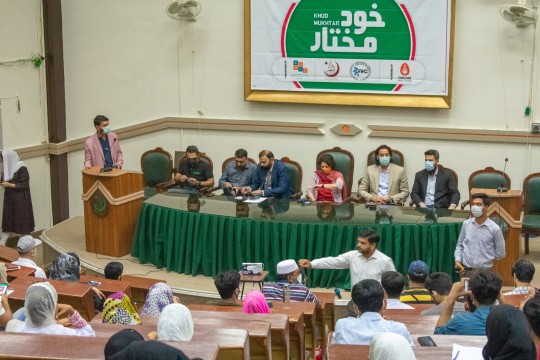





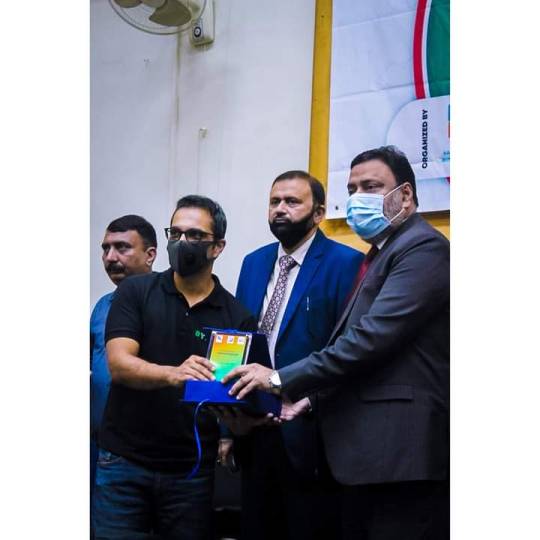

0 notes